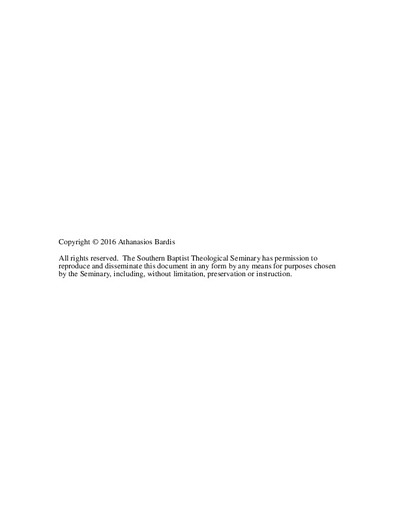| dc.description.abstract | This thesis examines and critiques from an evangelical perspective, the Greek Orthodox soteriological doctrine of theosis. In view of many exegetical and theological considerations, the thesis determines that the Eastern/Greek Orthodox doctrine of theosis overemphasizes and misconceives while distorting a doctrine of glorification by making it the regulatory soteriological factor through semi-Pelagianism, mysticism, sacramentalism, and excessive apophaticism. Chapter 1 presents an overview of the theological terrain of theosis and sets the context and direction of the paper. Chapter 2 traces the cosmological and anthropological foundations of theosis and the resulting ontological dependence, semi-Pelagianism, and synergism toward deification. Chapter 3 examines the excessive theological apophaticism of theosis, the essence/energies distinction, the germinating mystical approach, and the restrain of the role of the written revelation in the knowledge of God. Chapter 4 defines and explains the nature and function of defying grace in theosis in a context of hesychast spirituality, sacramentalism, and moralism. This chapter also emphasizes the foundation of theosis upon a dangerous extrapolation and misuse of the Chalcedonian definition regarding the union of the human and divine natures of Christ. Chapter 5 further questions theosis as a legitimate motif of salvation as it exposes its dangerous repercussions as well as how it confuses the ordo salutis. | en_US |

